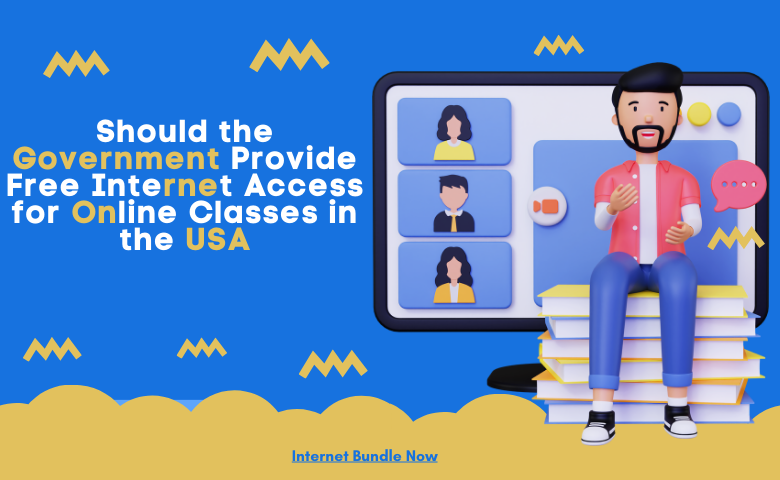- TV
How to Get Premium Channels with Your Cable TV Bundle?
Access to exclusive entertainment content is a priority for many viewers seeking a richer television experience. Premium chan...
Explore More
In today's increasingly digital world, access to the Internet has become a fundamental necessity, particularly for education. The COVID-19 pandemic has highlighted the importance of online learning, with schools and universities across the United States transitioning to virtual classrooms. However, one significant barrier to equal access to education is the digital divide – the gap between those with access to the Internet and those without access. In this article, we explore the debate surrounding whether the government should provide free internet access for online classes in the USA.
One of the primary arguments in favor of providing free internet access is the need to ensure equal access to education for all students. In today's digital age, access to the Internet is essential for students to complete assignments, participate in virtual classrooms, and access educational resources. However, many students, particularly those from low-income families, need more reliable internet access at home. By providing free internet access, the government can bridge the digital divide and ensure all students have an equal opportunity to succeed academically.
The COVID-19 pandemic has exacerbated existing inequalities in education, with students from low-income households disproportionately affected by school closures and the shift to online learning. With access to the Internet, these students may be able to keep up with their peers, leading to widening achievement gaps. Free internet access is essential for promoting educational equity and ensuring all students have the tools to succeed, regardless of their socioeconomic background.
Access to the Internet is crucial for academic success in today's digital age. Students rely on the Internet to access research materials, communicate with teachers and classmates, and complete assignments. With reliable internet access, students may stay caught up in their studies and need help to keep up with the demands of online learning. By providing free internet access, the government can promote academic success and ensure all students have the resources to thrive in their studies.
Investing in free internet access for education can have significant long-term economic benefits. A well-educated workforce is essential for driving economic growth and innovation, and access to the Internet is crucial for acquiring the skills needed to succeed in today's digital economy. By ensuring that all students have access to the Internet, the government can help prepare the next generation for future jobs, leading to increased productivity and economic prosperity.
In an increasingly interconnected world, access to the Internet is essential for maintaining competitiveness on a global scale. Countries that invest in digital infrastructure and ensure widespread internet access are better positioned to compete in the global marketplace. The government can help ensure that the United States remains competitive in an increasingly digital world by providing free internet access for online classes.
Despite the compelling arguments in favor of providing free internet access, there are also valid concerns about the cost. Providing free internet access to millions of students nationwide would undoubtedly incur significant expenses for the government. In an era of budget constraints and competing priorities, policymakers must carefully consider the financial implications of such a program.
The government should not necessarily be responsible for providing internet access when private sector providers already offer these services. Encouraging competition and innovation in the private sector may be a more efficient and cost-effective approach to ensuring widespread internet access.
Another concern is that providing free Internet access could foster a dependency on government services, discouraging individuals from seeking out alternative solutions or innovations in accessing the Internet. Free government-provided internet access could stifle competition and innovation in the private sector, ultimately hindering technological advancement.
Government-provided internet access may also raise concerns about privacy and government surveillance. Robust regulations should protect users' privacy and ensure fair and equal access. Without adequate safeguards, there is a risk that government-provided internet access could infringe on individuals' privacy rights.
Finally, providing free Internet access could disincentivize private investment in Internet infrastructure. Suppose the government provides internet access for free. In that case, private companies may be less inclined to invest in expanding and improving internet infrastructure, which could ultimately hinder technological advancement and innovation in the long term.
The debate over whether the government should provide free internet access for online classes in the USA is complex and multifaceted. While there are compelling arguments in favor of providing free internet access to ensure equal access to education and promote economic growth, there are also valid concerns about the cost, role of the private sector, dependency, privacy, and potential disincentives for private investment. Ultimately, policymakers must carefully weigh these considerations, explore innovative solutions to bridge the digital divide and ensure that all students have the tools they need to succeed in today's digital world.
Latest insights, tips, and updates from our experts.
Super Admin
Should the Government Provide Free Internet Access for Online Classes in the USA